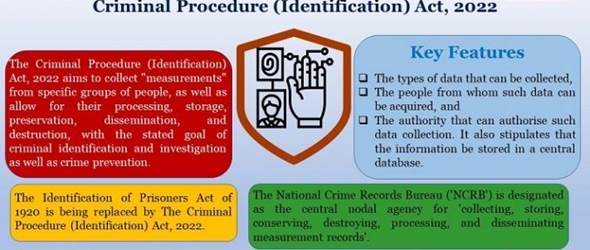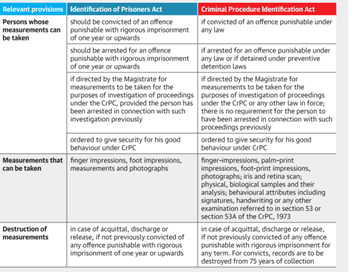Description

Copyright infringement not intended
In News
- Recently the Union Home Ministry issued a notification to implement the Criminal Procedure (Identification) Act, 2022.
- The new Act will repeal the Identification of Prisoners Act, 1920.
- The Act provides a legal sanction to law enforcement agencies for “taking measurements of convicts and other persons for identification and investigation of criminal matters.
- The Union government stated that the sole purpose is to improve the conviction rate in the country and to safeguard the human rights of law-abiding citizens.
Details
- Under the new Act, The Measurements and photographs for identification would serve 3 main purposes;
- Establish the identity of the culprit against the person being arrested.
- Identify suspected repetition of similar offences by the same person.
- Establish a previous conviction.

Provisions under Identification of Prisoners Act, 1920;
- The police have powers of arrest, but that does not give them the right to search a person.
- The police needed legal sanctions to search the person and collect evidence. These legal sanctions were designed to maintain a balance between the rights of an individual and the interests of society.
- It became essential when the recording of newer forms of evidence such as fingerprints, footprints and measurements became more accurate and reliable.
- Over the years, many legal experts and activists have demanded to amend/update the Identification of Prisoners Act, 1920.
- In 1980, the 87th Report of the Law Commission of India recommended several amendments;
- Amend the Act to expand the scope of measurements to include “palm impressions”, “specimen of signature or writing” and “specimen of voice”.
- Allowing measurements to be taken for proceedings other than those under the Code of Criminal Procedure (CrPC).

Copyright infringement not intended
Key Features of the Criminal Procedure (Identification) Act, 2022.
- It would allow the police and prison authorities to collect, store and analyse physical and biological samples, including retina and iris scans.
- It would empower the police to collect finger impressions, palm print impressions, footprint impressions, iris and retina scans, footprint impressions, physical, and biological samples and their analysis, and behavioural attributes including signatures, handwriting or any other examination.
- Biological samples can be forcibly collected from the convicted or persons arrested for crimes against women or children, or in case the crime attracts a minimum of 7 years in jail.
- It can also be taken on the order of a magistrate to assist the investigation.
- It also seeks to apply the above provisions to persons held under any preventive detention law.
- As per the provisions of the act any person convicted, arrested or detained under any preventive detention law will be required to provide the above-mentioned measurements to the police or a prison official.
- If any person resists or refuses to allow the taking of such measurements, it shall be lawful for the police officer or prison officer to take such measurements in such manner as may be prescribed.
- Resistance to or refusal to allow the taking of measurements under this Act shall be deemed to be an offence under section 186 of the Indian Penal Code.
- It would authorize the police to take and preserve records of convicts and other persons for identification and investigations.
- It would repeal the existing Identification of Prisoners Act, 1920.
Implementing body
- The National Crime Records Bureau (NCRB) will be the repository of physical and biological samples, signatures and handwriting data that can be preserved for at least 75 years.
- The State Government and Union territory Administration may notify an appropriate body to collect preserve and share the measurements in their respective jurisdictions.
Arguments in favour of the Act
- It will Protect the Human rights of the law-abiding victims of crime
- It will improve the conviction rate in the country.
- It will ensure a foolproof mechanism to prevent any data leak or misuse.
- Providing the sample will be voluntary for a person detained under any preventive law, they could not be forced to give the sample.
- No analysis or brain-mapping test would be performed without the person’s approval.
Arguments against the Act
- The issue of data protection.
- Possible misuse of the proposed law.
- Violation of the citizen’s right to privacy and other fundamental rights.
Way Forward
- The Identification of Prisoners Act, 1920 was colonial legislation, its repetition in the Criminal Procedure (Identification) Act, 2022 has raised some concerns related to fundamental rights.
- According to some activists, the act violet the right to privacy as per the Puttaswamy case judgment.
- Concerns that data processing may go beyond the recording of core measurements, and fear of data leakage or data theft.
- The Government needs to take concrete steps to redress the grievances raised by different stakeholders in order to ensure smooth implementation of the law.
https://epaper.thehindu.com/Home/ShareArticle?OrgId=G0PA50TT6.1&imageview=0
https://t.me/+hJqMV1O0se03Njk9
















